Nadieżda Zięba spoke to Badzine Poland recently about her career and what effects motherhood will have on it.
Interview by Monika Plata, with contributions from Agnieszka Pugacewicz. Photos: Badmintonphoto
Nadieżda Zięba is one of the best-known faces of Polish badminton. She and mixed doubles partner Robert Mateusiak became the nation’s first European Badminton Champions in 2012 and before that had taken two Superseries titles. However, Zięba’s first top-flight title was at the 2006 Denmark Open in women’s doubles.
Born in Belarus, Nadia Zięba has had a long road and an interesting career and she spoke to Badzine’s Poland correspondents recently about a variety of aspects of her life in and out of badminton. The interview came shortly after her announcement, this past autumn, that she and her husband are expecting their first child in 2014 and Zięba began by clarifying what that means for her badminton career.
Badzine Poland: Badminton world received the news that you are expecting a baby and that … you would give up badminton forever. Is it true that you are not going to come back to playing any more?
Nadia Zięba: No, actually I was misunderstood by one of the journalists. I said it will be hard. However, I hope that I will succeed. Actually, I had planned earlier with Robert (Mateusiak) that we would continue to play until the 2013 World Championships and after that I would start to realize my personal plans.
Badzine: Regarding your plans for the future, how many more years are you going to play?
Zięba: I do not make such plans. I have no idea if it will be two years or five years. From my own experience, I know how difficult it is to come back to match fitness again after a long break. Back In 2008, I had a surgery on both hips and after that I had to give up playing women’s doubles. It is never easy. There is no plan. I will see what to do. So far, I am just taking care of my general condition.
Badzine: What do you see yourself doing once you do retire? You once wanted to be a teacher, is that correct?
Zięba: Now I tend to think of being a badminton coach. I used to shun this option in the past. Maybe I just needed to be mature enough. I would like to go for a coaching course and develop my coaching skills further. We will see what life brings.
Badzine: In Poland or abroad?
Zięba: Definitely in Poland. I have already moved to another country once and it is not easy. I am talking about when I moved from Belarus to Poland, which are in many aspects similar countries. I do not want to go through this again.
Badzine: Polish players do not often take the opportunity to promote themselves via social media, like personal websites, Facebook or Twitter. Are you going now, during a break from playing, to use social media?
Zięba: I do not like this type of publicity. In general, I am not the kind of a person who likes to be in the spotlight. I appreciate my privacy very much. I do occasionally log onto Facebook and check email. I do not intend to prepare my own website.
I think that in Poland, badminton is not popular enough to find a sponsor through your own website or social media; however it is getting better and better. At the moment, the players are starting to look for sponsors on their own. Usually the sponsors that support badminton are badminton enthusiasts, people who once fell in love with badminton. I hope that we will have more and more badminton sponsors in future.
Badzine: At the beginning of the season, you signed a contract with the German first league team, EBT Berlin, but you have never played a single match with them.
Zięba: Yes, it is true, the team manager knew that I was planning to get pregnant, but the team took the risk assuming that I would play as long as I could. Maybe they were not expecting that I would get pregnant so quickly, but they were really fair with me.
In the Danish club where I played recently, there have been financial problems for a long time. Several sponsors retreated and decided that in the next season [2013-2014] the club will engage more young players. Despite this, after the final match of the Danish league, there was one person who wanted to individually sponsor my game.
However, the club management, knowing my plans, decided that it was too risky for them to offer me a place in the team. The Danes have indicated that after my baby is born, if I want to get back into the game, I should speak to them first.
Badzine: Do all athlete mothers behave with such class?
Zięba: I believe that being fair pays. I would feel bad if I had told someone the pregnancy was unplanned.
Badzine: Did Mateusiak also want to stay in the Danish league?
Zięba: Robert and I both knew, since the mid of the last season, that our team had financial problems and that we would probably have to look for a new club. Robert found a club in France. He already played there and he was very satisfied. In France, there are rich clubs that have a lot of money dedicated for the development of the players.
Badzine: It would seem that the best conditions for the players are provided in Denmark?
Zięba: Contrary to expectations – not entirely. In Denmark, the best players, with the help of their sponsors, are responsible for contributing a portion of the costs of participating in the tournaments.
However, in my opinion, overall, the Danes have a perfect club system. Each club is working with a very good coach, so only technically well-prepared players join the national centre in Copenhagen. Young badminton players take part in many tournaments and the participation costs are shared by themselves and their sponsors.
One very good idea they have is a second division league, where in one team tie, there are 13 matches played, and each player each player must play in two categories – either singles and doubles or doubles and mixed. It gives young people the opportunity to getting used to playing in tournaments. Matches are arranged for the weekends, so they do not interfere with school, for example. This is what makes this separate second league for young players possible. I think this is a very good system.
Badzine: How did you join the Danish league?
Zięba: At that time Kenneth Jonassen, who is a friend of Robert Mateusiak, was playing in my first team [Greve]. Jonassen asked Zico if I wanted to join the team. I agreed, of course, as it was a big chance for me.
For the first year I played alone, and later they also invited Robert, to make the team stronger. From the beginning, there was a very nice atmosphere in the club, especially when Kenneth was there as a player and a manager at the same time. I have very good memories of those times. I learned a lot from the Danes, not to mention the fact that, together with Robert, we had this opportunity to play on a very high level.
Badzine: Would you say that you are more recognized as an athlete in Denmark than in Poland?
Zięba: Yes. In Denmark, in general, there is a very cool atmosphere around the badminton league. People come to the games with their kids. During the matches, the players sit among the audience, so everyone can talk to them and often the fans come up to ask how we are, what our plans are for the future, etc.
In Poland, the league does not have this atmosphere, but I think it is still getting better, because badminton is gaining more and more people at the amateur level, and thus – I hope – more and more children will want to practice this sport. However, I think that there is a shortage of places where children could train regularly in Warsaw.
Badzine: You once played not only the mixed doubles but singles and women’s doubles. Which game is your favourite?
Zięba: Mixed doubles is the best for me because I am not a type of a player who is very strong physically. The women’s doubles at the global level is an extremely challenging game. Matches last even for one and a half hours. The doubles game is very tiring. In addition, the mixed doubles are more spectacular, more interesting to watch than women’s doubles.
Badzine: What was the turning point in your career?
Zięba: I think that such a moment was my arrival in Poland. That is when it all started. Moving to Poland created new opportunities for me which did not exist in Belarus. For example, there were no female sparring partners in Belarus. I trained with the boys, just because I played well.
Moreover, there were completely different types of workouts in Poland, I mean – more professional. At first I thought I would play a little bit in Poland, practice, and get back to Belarus, but it did not happen, although I still do not really know how my later life will go, after I finally retire.
Badzine: When, over all these years of your career, have you had the best conditions for training?
Zięba: All in all, I have always had good conditions for training. It is well known that the biggest inflows of funds go to the players who are successful, although I think that the biggest subsidy from the Polish Ministry of Sports was at the very beginning of the operation of a training centre in Warsaw. At that time, even younger players participated in a lot of various tournaments.
For the last few years, there have been clashes because some players felt that too much money went for us and on our international tournaments. If you look at it from their point of view, they also trained hard, and they were not able to take part in international tournaments as often as we did. I think there will always be this kind of misunderstanding if there is not enough money and the management has to choose whom to send to one tournament or another.
It is nice that there are now such programs that offer a pool of money also for younger players. Thanks to this, the juniors start to play better and better. However, there is still a shortage of girls playing badminton.
Badzine: Which of your coaches do you appreciate the most?
Zięba: This is a difficult question. Each coach has their advantages and disadvantages. Klaudia Mayorova was, in my opinion, a very good coach, however in terms of communication between players and the coach there were some issues.
Kim [Young Man], a coach from Korea, worked us very hard and most players training at the national centre made significant progress thanks to him even though we trained more in an Asian style, which is different from the training in Europe. You just had to meet the goals set by the coach, who was not interested if you were tired or not.
Recently we have just begun training with a head coach Jacek Hankiewicz. He is certainly a coach with experience, he is not afraid of a criticism and he is always open to new ideas and can reach agreement with every player. This is an important trait for a coach.
Badzine: Robert and you have been participating in a few tournaments without a coach. Who was with you courtside then?
Zięba: Well, that is a good question. This has put us in a difficult situation already at the start. Sometimes even another player who can sit courtside and watch the match from a different perspective can be helpful. And you listen to their remarks in a different way form the remarks given by your partner, who is actually playing with you. This is something really different.
Sometimes, when you play under a lot of stress, remarks or opinions from your partner may simply frustrate you. I always liked having someone sitting behind us during the matches, giving us advice between the rallies. You feel then that you are not completely on your own. Of course, we have often played alone and we did very well but even then, I think it would have been better if we consistently had the tactical support from outside the court.
Robert and I have spent so much time together travelling on our own for tournaments that it is sometimes even hard to look at each other. After staying together non-stop for two weeks, often an argument is imminent, but it can be good just because it can clear the atmosphere between us.
Badzine: Is there any decision regarding badminton, which you regret?
Zięba: I do not look at it that way. Even when it turns out that something went wrong, I do not look back. I simply go on and do not waste energy dwelling on what went wrong. I simply do not wonder about it.
Badzine: If you could choose freely the best country in Europe to play badminton, your choice would be…
Zięba: From what I have heard the best conditions for badminton are now available in France.
Badzine: If you had to identify the most promising young Polish players, who would they be?
Zięba: Certainly Miłosz Bochat. And also Piotr Wasiluk, Mateusz Świerczyński, Maciek Dąbrowski, Mateusz Biernacki, and one girl: Magdalena Witek.
Badzine: Why are the girls missing in badminton?
Zięba: May be the girls these days are a little bit lazy? I think that for some time the girls were neglected. Now it is changing because juniors were invited to train at the national centre in Warsaw. Younger players often train with older and thus develop their skills. In my opinion, these players who have been training for some time at the national centre have already made good progress.
Badzine: If you were the President of the Polish Badminton Association (PZBad), what would you change first?
Zięba: First of all I would never like to hold the post of PZBad President. But if I could somehow help the players, it would certainly be with financial support. I wish the players did not have to be wondering whether there will be any trips to international tournaments in the coming year, and if so, how many people would go and, in the end, would there also be funds for the coach to travel too, not to mention the physiotherapists.
If it was in my power, I would find sponsors (although I know it is not easy to do). For example, Michał Rogalski, who has been training at the national centre for many years, has never had the opportunity to participate in international tournaments continuously throughout a year. When you take part in 2-3 tournaments a year, it simply does not work. If something goes bad at one tournament and you know that for the next half a year you would not go anywhere else, you lose your motivation. On the contrary, a player needs to be sure that even after one or two failures, (s)he will continue to have the opportunity to prove to the coach that (s)he still deserves a place in the national team.
The English invest in young players so that the juniors start participating in tournaments at the age of 17-18 and for 4-5 years they get used to playing at the international arenas. From my experience, I can say that from a group of twenty people about ten become very high level players. One cannot forget that in England they have a lot more funds compared to Poland, so I told you before that sponsorship is unfortunately an essential condition for improving the quality of training in Poland.
Badzine: What would be your ideal mixed doubles partner?
Zięba: I had a chance to play twice with Joachim Fischer in the Danish league, and it went very well. It is great with the Danes because they are so well trained that they can predict what the opponent is going to play from a specific place on the court. So they often instinctively position themselves where the return will come. This is called good reading of the game and we lack it here, so we should learn from them as future coaches.
We, the Poles, are often better but in the end we get lost, we do not know what to do. Generally speaking, most of my life I played with Robert and I think we are a well-matched mixed pair. We understand each other well on court and we both want the same thing – to win. Any disagreements – which can always happen – we solve on the spot, so there are no conflicts or misunderstandings between us.
Badzine: Which mixed pair you admire the most?
Zięba: Generally – the Danes. Everyone thinks they have super conditions and it is not true. They are very determined and fierce. When the Danes from different clubs play against each other in the Danish league, sometimes I have the impression that they could kill each other. This seems to be real determination and is all about proving who is better. They also have a lot of self-confidence and high self-esteem. However it is hard to name a particular pair.
Badzine: There aren’t any Asian pairs whom you admire?
Zięba: The Asians are spoon-fed: training, coaches, sponsors, better funding. But this, of course, does not detract at all from the work they put into their workouts.
Badzine: Do you have any role model in badminton?
Zięba: I often hear this question and it will probably surprise you but no, I do not. Maybe it is wrong, but that’s just how it is. I have neither a life role model nor any idols. Generally, I like to listen to wise people and I admire specific traits, for example, which I do not possess myself. Everyone has weaknesses. You should take a little bit of what is good in everyone.
Badzine: Which badminton tournament was unique for you?
Zięba: I enjoyed Australia very much. Before the Olympics, there was a point when I returned to playing after a two-month break due to injury and we only had 4 tournaments (Australia, the Netherlands, European Championships, and India) left to fight for Olympic qualification. I was terribly stressed because without training, I had to play a match with the opponents we were competing with to qualify for the Olympics.
We won and it turned out that the break in training did well for us, especially mentally. When we won that match, I was really very happy. This is the coolest part, when you succeed if you do not expect it. In general, together with Robert we usually managed to win after the breaks. The same happened in Indonesia, when we won the Grand Prix.
Badzine: So should we dread what will happen with your next comeback?
Zięba: I hope you are right.
Badzine: What do you consider your greatest success?
Zięba: I think the last year European Championships title.
Badzine: And the biggest success in your personal life?
Zięba: The family and the baby we are expecting. I think that just when a baby arrives, the family is complete.
Badzine: How would you encourage people to let their children play badminton?
Zięba: Contrary to the general opinion, this is a very intellectual sport. It is not only physical preparation and technique, but also thinking on the court. Besides, it is a sport that develops harmoniously all parts of the body and a family sport you may play together.
Badzine: Do you miss your family in Belarus?
Zięba: I miss them very much. It may seem that it has been so many years since I left so I should have got used to it, but that is not how it is. I’ve got my whole family there and I often feel nostalgia. Who knows? Maybe one day I will be able to go back. That is why I would not want to move abroad again. I could only return to my place, to Belarus.
Badzine: Has anyone else in your family played badminton?
Zięba: My sister is a badminton coach. She played till the age of 18 or 19, at a little bit lower level than me. She graduated from the Sports Academy. Now she trains children. She often comes to Poland for tournaments. That is why I can frequently see her.
Badzine: Is your child destined for badminton?
Zięba: My wish is that my child will just choose what she or he wants to do in life. One cannot force a child to take up a particular sport. I still remember when my dad got me to try various sport activities when I was little. I did not like one place because the instructor was not nice. I did not want gymnastics because I was afraid of jumping over the vaulting horse. In the end, I landed in badminton classes: not because my parents wanted me to, but because I liked it. It just wasn’t even possible for me to stop attending.
However, I think that if a child observes the parents playing sports, then the child wants to, too. The parents shape children’s behaviour and habits.
Badzine: Is sport important?
Zięba: Of course it is. Not necessarily a professional sport, because there are always injuries. But the life of an athlete is cool. Tough but nice. Sport teaches life, coping with problems, self-reliance, resourcefulness, openness and you can always meet many interesting people. Even more so now, when players are forced to arrange a lot of things on their own – planning trips, buying tickets, looking for sponsors. I think that the role of parents should be limited to encouraging the child to try sports and not to choosing a particular one. Sport teaches good self-management. There is no time for pointless things.
![Nadia Zięba: There is no plan, I will see what to do Nadieżda Zięba spoke to Badzine Poland recently about her career and what effects motherhood will have on it. Interview by Monika Plata, with contributions from Agnieszka Pugacewicz. Photos: Badmintonphoto Nadieżda […]](http://www.badzine.net/wp-content/uploads/Newsflash-thumbnail.png)
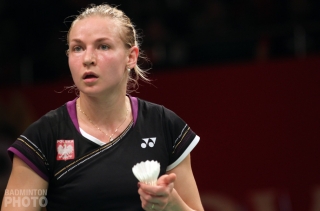
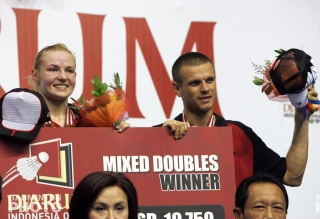
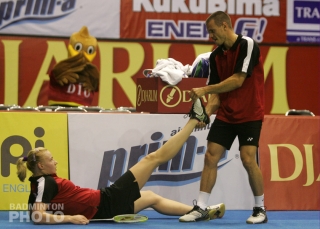
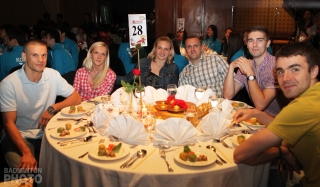
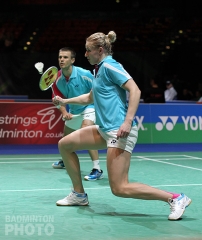
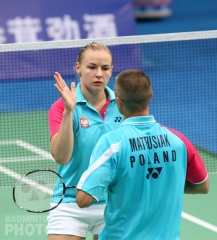
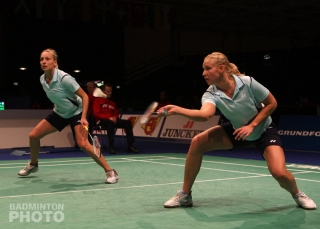
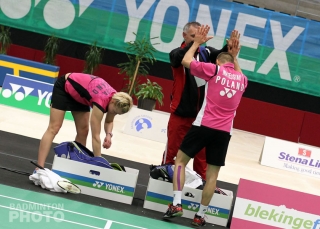
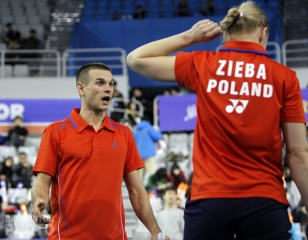
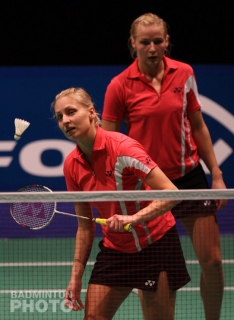
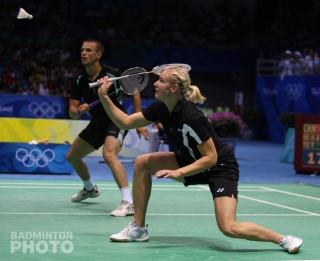
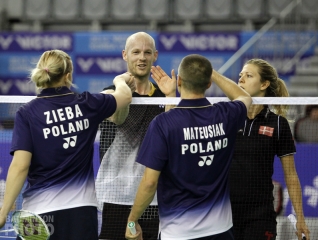
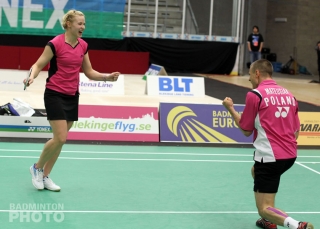
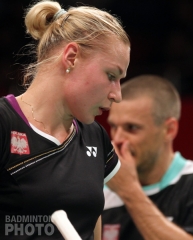
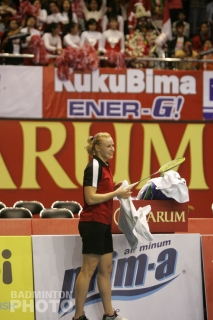
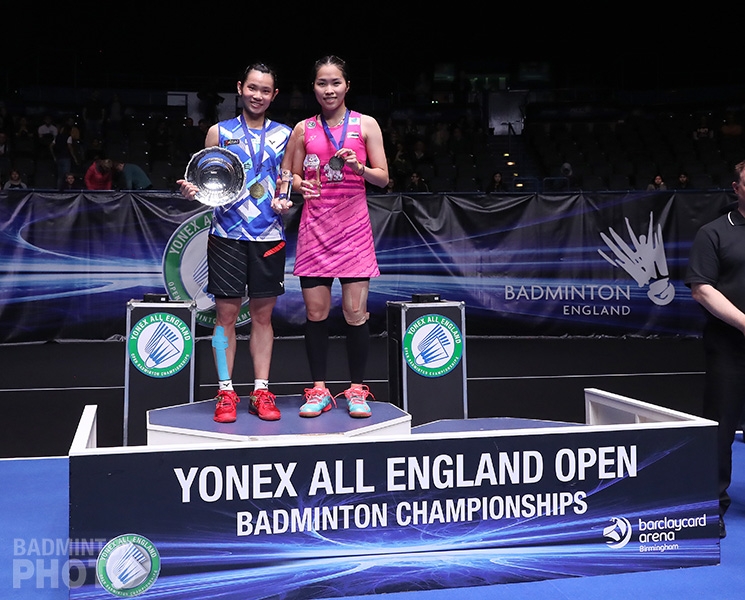
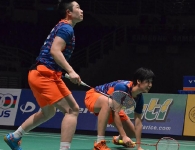
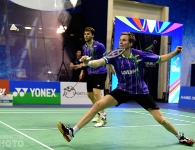
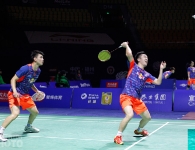
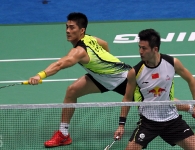
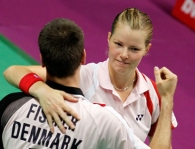
Leave a Reply